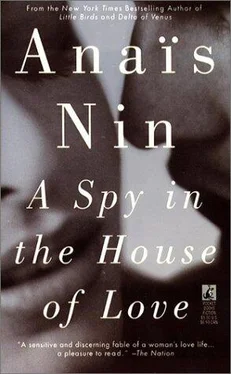Oh, she was tired, but it was not from loss of sleep, or from talking too much in a smoke-filled room, or from eluding Jay’s caricatures, or Mambo’s reproaches, or Philip’s distrust of her, or because Donald by his behavior so much like a child had made her feel that her thirty years were a grandmother’s age. She was tired of pulling these disparate fragments together. She understood Jay’s paintings too. It was perhaps at such a moment of isolation that Madame Bovary had taken the poison. It was the moment when the hidden life is in danger of being exposed, and no woman could bear the condemnation.
But why should she fear exposure? At this moment Alan was deeply asleep, or quietly reading if he were not asleep.
Was it merely this figure of a lie detector dogging her steps which caused her so acute an anxiety?
Guilt is the one burden human beings cannot bear alone.
After taking a cup of coffee, she went to the hotel where they knew her already, took a sleeping pill, and took refuge in sleep.
When she awakened at ten o’clock that night she could hear from her hotel room the music from Mambo’s Night Club across the street.
She needed a confessor! Would she find it there, in the world of the artists? All over the world they had their meeting places, their affiliations, their rules of membership, their kingdoms, their chiefs, their secret channels of communication. They established common beliefs in certain painters, certain musicians, certain writers. They were the misplaced persons too, unwanted at home usually, or repudiated by their families. But they established new families, their own religions, their own doctors, their own communities.
She remembered someone asking Jay: “Can I be admitted if I show proofs of excellent taste?”
“That is not enough,” said Jay. “Are you also willing to become an exile? Or a scapegoat? We are the notorious scapegoats, for living as others live only in their dreams at night, for confessing openly what others only confess to doctors under guarantee of professional secret. We are also underpaid: people feel that we are in love with our work, and that one should not be paid for doing what you most love to do.”
In this world they had criminals too. Gangsters in the world of art, who produced corrosive works born of hatred, who killed and poisoned with their art. You can kill with a painting or a book too.
Was Sabina one of them? What had she destroyed?
She entered Mambo’s Night Club. The artificial palm trees seemed less green, the drums less violent. The floor, doors, walls were slightly askew with age.
Djuna arrived at the same moment, her black rehearsal tights showing under her raincoat, her hair bound in a ribbon like a school-girl’s.
When such magical entrances and exits take place in a ballet, when the dancers vanish behind columns or dense hills of shadows, no one asks them for passports or identifications. Djuna arrived as a true dancer does, walking as naturally from her ballet bar work a few floors above the night club as she had in Paris when she studied with the Opera ballet dancers. Sabina was not surprised to see her. But what she remembered of her was not so much her skill in dancing, her smooth dancer’s legs, tense, but the skill of her compassion, as if she exercised every day on an invisible bar of pain, her understanding as well as her body.
Djuna would know who had stolen, who had betrayed, and what had been stolen, what had been betrayed. And Sabina might cease falling—falling from all her incandescent trapezes, from all her ladders to fire.
They were all brothers and sisters, moving on the revolving stages of the unconscious, never intentionally mystifying others as much as themselves, caught in a ballet of errors and impersonations, but Djuna could distinguish between illusion and living and loving. She could detect the s hil of a crime which others could not bring to trial. She would know the identity of the criminal.
Sabina had only to wait now.
The drums ceased to play as if they were muffled by several forests of intricate impenetrable vegetation. Sabina’s anxiety had ceased to beat against her temples and deafen her to outer sounds. Rhythm was restored to her blood and her hands lay still on her lap.
While she waited for Djuna to be free she thought about the lie detector who had been watching her actions. He was there in the cafe again, sitting alone, and writing in a notebook. She prepared herself mentally for the interview.
She leaned over and called him: “How do you do? Have you come to arrest me?”
He closed his notebook, walked over to her table, sat down beside her. She said: I knew it would happen, but not quite so soon. Sit down. I know exactly what you think of me. You are saying to yourself: here is the notorious imposter, the international spy in the house of love. (Or should I specify: in the house of many loves?) I must warn you, you must handle me delicately: I am covered with a mantle of iridescence as easily destroyed as a dust flower, and although I am quite willing to be arrested, if you handle me roughly you will lose much of the evidence. I don’t want you to taint that fragile coat of astonishing colors created by my illusions, which no painter has ever been able to reproduce. Strange, isn’t it, that no chemical will give a human being the iridescence that illusions give them? Give me your hat. You look so formal and uncomfortable! And so you finally tracked down my impersonations! But are you aware of the courage, the audacity which my profession requires? Very few people are gifted for it. I had the vocation. It showed very early in my capacity for deluding myself. I was one who could call a backyard a garden, a tenement apartment a house, and if I were late when I came home, to avoid a scolding I could imagine and recreate instantly such interesting obstacles, adventures, that it would take my parents several minutes before they could shake off the spell and return to reality. I could step out of my ordinary self or my ordinary life into multiple selves and lives without attracting attention. I mean that my first crime, as you may be surprised to hear, was committed against myself. I was then a corrupter of minors, and this minor was myself . What I corrupted was what is called the truth in favor of a more marvelous world. I could always improve on the facts. I was never arrested for this: it concerned only myself. My parents were not wise enough to see that such prestigitation of facts might produce a great artist, or at least a great actress. They beat me, to shake out the dust of delusions. But strangely enough, the more my father beat me, the more abundantly did this dust gather again, and it was not gray or brown dust as you find it in its daily form, but what is known to adventurers as fool’s gold. Give me your coat. As an investigator you may be more interested to know that in self-defense, I accuse the writers of fairy tales. Not hunger, not cruelty, not my parents, but these tales which promised that sleeping in the snow never caused pneumonia, that bread never turned stale, that trees blossomed out of season, that dragons could be killed with courage, that intense wishing would be followed immediately by fulfillment of the wish. Intrepid wishing, said the fairytales, was more effective than labor. The smoke issuing from Aladdin’s lamp was my first smokescreen, and the lies learned from fairy tales were my first perjuries. Let us say I had perverted tendencies: I believed everything I read.
Sabina laughed at her own words. Djuna thought she was drinking too much and looked at her.
“What made you laugh, Sabina?”
“Meet the lie detector, Djuna. He may arrest me.”
“Oh, Sabina. You’ve never done anything to be arrested for!”
Djuna gazed at Sabina’s face. The intentness of it, the feverishness she had always seen on it was no longer that of burning aliveness. There was a tightness to the features, and fear in the eyes.
Читать дальше












